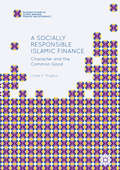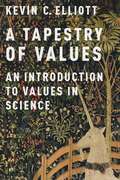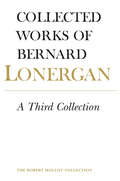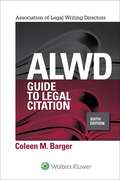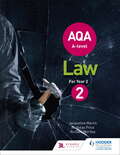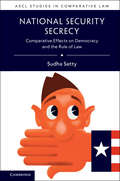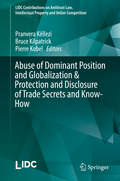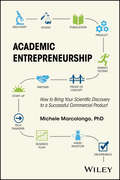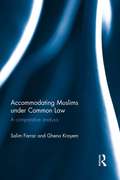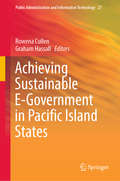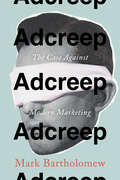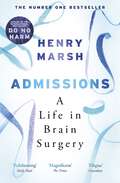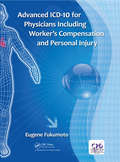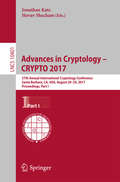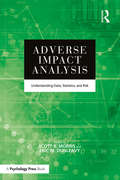- Table View
- List View
A Shattered Circle: A Novel
by Kevin EganAfter an accident leaves New York City judge William Lonergan mentally impaired, his wife, Barbara, who doubles as the judge’s confidential secretary, is determined to protect his health, his career, and his reputation. Barbara and Larry Seagle, the judge’s law clerk, support Judge Lonergan enough for him to fulfill his judicial duties, keeping his true condition secret. Months pass under this exhausting routine, until suddenly Barbara finds her new way of life under siege.A private investigator needs Judge Lonergan's help in investigating the murder of a well-known lawyer in upstate New York. A bitter litigant files a grievance against the judge with the Judicial Conduct Commission. Driven by loyalty and guilt, court officer Foxx is looking into a decades-old courthouse murder to exonerate a childhood friend who is dying in prison. He hits many dead ends, until he learns that Barbara Lonergan, who worked as a stenographer long before she married the judge, likely has information about the murder victim.After the judge is attacked, Barbara decides they should leave New York City. Arriving at their summer house, Barbara believes that she and the judge are safe. She could not be more wrong.A Shattered Circle by Kevin Egan is a tensely plotted legal thriller set in New York City's iconic 60 Centre StreetAt the Publisher's request, this title is being sold without Digital Rights Management Software (DRM) applied.
A Socially Responsible Islamic Finance: Character and the Common Good (Palgrave Studies in Islamic Banking, Finance, and Economics)
by Umar F. MoghulThis book explores how, through spirituality and the development of character, Islamic financial institutions and Muslim communities can integrate their businesses with contemporary social responsibility initiatives to produce positive social and environmental impact. From the looming environmental crisis to the divide between mainstream and extremist interpretations of Islam, the book addresses significant questions facing Muslim communities - and humanity - and demonstrates why Islam should sit 'at the table' with other faiths and ethical traditions discussing humanity's great obstacles. Unlike existing literature, this work explores the intersections between classical Islamic ethics and spirituality, contemporary Islamic finance and economic markets, and select sustainability and impact initiatives (such as the Equator Principles and UN Principles of Responsible Investment) designed to make the worlds of business and finance responsible for the environments in which they operate and the communities that support them. Drawing on his years of experience in Islamic banking, Moghul addresses these applications in light of real-world practices and dilemmas, demonstrating how Islamic organizations and Muslim communities should embrace the broad range of stakeholders countenanced by the Shari'ah in conversations that affect them. By situating his exploration of Islamic finance in the light of the much larger critical issues of balance, justice, and moderation in Islamic praxis, Moghul creates an interdisciplinary book that will appeal to academics and researchers in economics, finance, business, government and policy, and law.
A Tapestry of Values: An Introduction to Values in Science
by Kevin Elliott<p>The role of values in scientific research has become an important topic of discussion in both scholarly and popular debates. Pundits across the political spectrum worry that research on topics like climate change, evolutionary theory, vaccine safety, and genetically modified foods has become overly politicized. At the same time, it is clear that values play an important role in science by limiting unethical forms of research and by deciding what areas of research have the greatest relevance for society. Deciding how to distinguish legitimate and illegitimate influences of values in scientific research is a matter of vital importance. <p>Recently, philosophers of science have written a great deal on this topic, but most of their work has been directed toward a scholarly audience. This book makes the contemporary philosophical literature on science and values accessible to a wide readership. It examines case studies from a variety of research areas, including climate science, anthropology, chemical risk assessment, ecology, neurobiology, biomedical research, and agriculture. These cases show that values have necessary roles to play in identifying research topics, choosing research questions, determining the aims of inquiry, responding to uncertainty, and deciding how to communicate information. <p>Kevin Elliott focuses not just on describing roles for values but also on determining when their influences are actually appropriate. He emphasizes several conditions for incorporating values in a legitimate fashion, and highlights multiple strategies for fostering engagement between stakeholders so that value influences can be subjected to careful and critical scrutiny.</p>
A Target on my Back: A Prosecutor's Terrifying Tale of Life on a Hit List
by Erleigh WileyMurders don't happen in Kaufman County, Texas, a sleepy community where people raise their kids quietly and drive into Dallas for work and entertainment. In 2013, murder came to town when two professional prosecutors were slain in cold blood, simply for doing their jobs: one in broad daylight in plain view of the courthouse, and one in his home, along with his wife. Eric Williams is responsible for all the bloodshed, and he has a list of who to kill next.A Target on My Back is the first-person true story of Erleigh Wiley, an accomplished lawyer who accepted the job as the new district attorney, after the death of her predecessors, which turned her into the next target on the killer's hit list. This is her story of how she and her family endured the storm of the press, the array of Homeland Security agents assigned to protect them 24/7, and the weight of knowing she was someone's prey. Though fearing for her life, she served as the prosecution's final witness against the murderer, sealing his fate on death row. This chilling account of how she survived the hit list is a terrifying cat and mouse tale.
A Third Collection: Volume 16
by John Dadosky Bernard Lonergan Robert Doran, S.J. Lonergan Research InstituteA Third Collection, prepared for the Collected Works of Bernard Lonergan by editors Robert M. Doran and John D. Dadosky, is a helpful companion to volumes four and thirteen in the series. The volume contains fifteen papers, written between 1974 and 1982, and includes some of his most important shorter writings such as "Prolegomena to the Study of the Emerging Religious Consciousness of Our Time" and "Natural Right and Historical Mindedness." The relevant archival entries are specified, so that readers can consult them. The papers in this volume rehearse in a new key the themes of a lifetime. Without in any way going back on the major emphases of Lonergan's early work–cognitional theory and then the exploration of a fourth, existential level of consciousness– they are focused more on love and on the movement from above downwards in consciousness. Community is emphasized as the context and the fruit of the emergence of authentic subjects.
A Time to Stand
by Robert WhitlowIn a small Georgia town where racial tensions run high and lives are at stake, can one lawyer stand up for justice against the tide of prejudice on every side?Adisa Johnson, a young African-American attorney, is living her dream of practicing law with a prestigious firm in downtown Atlanta. Then a split-second mistake changes the course of her career.Left with no other options, Adisa returns to her hometown where a few days earlier a white police officer shot an unarmed black teen who is now lying comatose in the hospital.Adisa is itching to jump into the fight as a special prosecutor, but feels pulled to do what she considers unthinkable—defend the officer.As the court case unfolds, everyone in the small community must confront their own prejudices. Caught in the middle, Adisa also tries to chart her way along a path complicated by her budding relationship with a charismatic young preacher who leads the local movement demanding the police officer answer for his crime.This highly relevant and gripping novel challenges us to ask what it means to forgive while seeking justice and to pursue reconciliation while loving others as ourselves.
ALWD Guide to Legal Citation
by Coleen BargerALWD Guide to Legal Citation, Sixth Edition provides the tools needed for all forms of legal writing, using clear explanations and abundant illustrations. In a single set of rules that the novice and experienced legal writers can easily consult, Professor Barger contrasts the formats used in practice-based documents with those used in academic footnotes.
AQA A-level Law for Year 1/AS
by Jacqueline Martin Nicholas PriceExam Board: AQALevel: AS/A-levelSubject: LawFirst Teaching: September 2017First Exam: June 2018This title has been approved by AQAAccurately cover the breadth of content in the new 2017 AQA A-level specification with this textbook written by leading Law authors, Jacqueline Martin and Nicholas Price. This engaging and accessible textbook provides coverage of the new AQA A-level Law specification and features authoritative and up-to-date material on the important changes to the law.- Book 1 covers all mandatory units for AS-level and for year 1 of a two-year course.- Important, up-to-date and interesting cases and scenarios highlight key points.- Discussion and activity tasks increase your understanding of more difficult concepts.- Practice questions and 'check your understanding' questions to help your students prepare for their exams.Authors:- Jacqueline Martin LLM has ten years' experience as a practising barrister and has taught law at all levels.- Nicholas Price is an experienced teacher of Law and an A-Level Law textbook author.
AQA A-level Law for Year 1/AS
by Jacqueline Martin Nicholas PriceThis title has been approved by AQAAccurately cover the breadth of content in the new 2017 AQA A-level specification with this textbook written by leading Law authors, Jacqueline Martin and Nicholas Price. This engaging and accessible textbook provides coverage of the new AQA A-level Law specification and features authoritative and up-to-date material on the important changes to the law.- Book 1 covers all mandatory units for AS-level and for year 1 of a two-year course.- Important, up-to-date and interesting cases and scenarios highlight key points.- Discussion and activity tasks increase your understanding of more difficult concepts.- Practice questions and 'check your understanding' questions to help you prepare for your exams.Authors:- Jacqueline Martin LLM has ten years' experience as a practising barrister and has taught law at all levels.- Nicholas Price is an experienced teacher of Law and an A-Level Law textbook author.
AQA A-level Law for Year 2
by Jacqueline Martin Nicholas Price Richard WortleyExam board: AQALevel: A-levelSubject: LawFirst teaching: September 2017First exams: Summer 2019This title has been selected for an AQA approval process.Accurately cover the breadth of content in the new 2017 AQA A-level specification with this textbook written by leading Law authors, Jacqueline Martin, Richard Wortley and Nicholas Price.This engaging and accessible textbook provides coverage of the new AQA A-level Law specification and features authoritative and up-to-date material on the important changes to the law.- Book 2 includes the second section of all mandatory units and both the Human Rights Law and Contract Law optional units.- Important, up-to-date and interesting cases and scenarios highlight key points.- Discussion and activity tasks increase your students' understanding of more difficult concepts.- Practice questions and 'check your understanding' questions to help you prepare for your exams.Authors:- Jacqueline Martin LLM has ten years' experience as a practising barrister and has taught law at all levels.- Richard Wortley has taught law at all levels. He has held a number of examining and assessing roles over the past 25 years. He retired from a management position in a large FE College to work freelance in law teacher support, writing and assessment work.- Nicholas Price is an experienced teacher of Law and an A-Level Law textbook author.
ASCL Studies in Comparative Law: Comparative Effects on Democracy and the Rule of Law (ASCL Studies in Comparative Law)
by Sudha SettyExcessive government secrecy in the name of counterterrorism has had a corrosive effect on democracy and the rule of law. In the United States, when controversial national security programs were run by the Bush and Obama administrations - including in areas of targeted killings, torture, extraordinary rendition, and surveillance - excessive secrecy often prevented discovery of those actions. Both administrations insisted they acted legally, but often refused to explain how they interpreted the governing law to justify their actions. They also fought to keep Congress from exercising oversight, to keep courts from questioning the legality of these programs, and to keep the public in the dark. Similar patterns have arisen in other democracies around the world. In National Security Secrecy, Sudha Setty takes a critical and comparative look at these problems and demonstrates how government transparency, privacy, and accountability should provide the basis for reform.
About Abortion: Terminating Pregnancy in Twenty-First Century America
by Carol SangerNew medical technologies, women’s willingness to talk online and off, and tighter judicial reins on state legislatures are shaking up the practice of abortion. As talk becomes more transparent, Carol Sanger writes, women’s decisions about whether to become mothers will be treated more like those of other adults making significant personal choices.
Abuse of Dominant Position and Globalization & Protection and Disclosure of Trade Secrets and Know-How (LIDC Contributions on Antitrust Law, Intellectual Property and Unfair Competition)
by Bruce Kilpatrick Pierre Kobel Pranvera KëlleziThis publication provides an unparalleled comparative analysis of two "hot topics" in the field of antitrust and unfair competition law with regard to a number of key countries. The first part of the book examines the prohibition of abuse of a dominant position and globalization in relation to two broad questions: first, whether there is consistency between the approaches of different jurisdictions to the notion of abuse, and, second, whether there are too many restrictions on legal rights and business opportunities resulting from the prohibition of abuse of dominance. The international report drafted by Professor Pinar Akman reveals that there are as many similarities as differences between the approaches of the twenty-one jurisdictions studied and presented in this book. This is an invitation to read the excellent international report as well as the reports on specific jurisdictions in order to grasp the variety of arguments and approaches of this antitrust area, which may, on the surface, appear alike. The second part gathers contributions on the question of protection and disclosure of trade secrets and know-how from various jurisdictions. The need for adequate protection of trade secrets has increased due to digitalization and the ease with which large volumes of misappropriated information can be reproduced. The comprehensive international report, prepared by Henrik Bengtsson, brings together these reflections by comparing various national positions. The book also discusses the resolutions passed by the General Assembly of the International League of Competition Law (LIDC) following a debate on each of these topics, and includes proposed solutions and recommendations.
Academic Entrepreneurship: How to Bring Your Scientific Discovery to a Successful Commercial Product
by Michele MarcolongoThe pathway to bringing laboratory discoveries to market is poorly understood and generally new to many academics. This book serves as an easy-to-read roadmap for translating technology to a product launch – guiding university faculty and graduate students on launching a start-up company.• Addresses a growing trend of academic faculty commercializing their discoveries, especially those supported by the National Science Foundation and National Institutes of Health• Offers faculty a pathway and easy-to-follow steps towards determining whether their discovery / idea / technology is viable from a business perspective, as well as how to execute the necessary steps to create and launch a start-up company• Has a light-hearted and accessible style of a step-by-step guide to help graduate students, post-docs, and faculty learn how to go about spinning out their research from the lab• Includes interviews by faculty in the disciplines of materials science, pharmaceuticals, medical devices, information technology, energy, and mechanical devices – offering tips and discussing potential pitfalls to be avoided
Accommodating Muslims under Common Law: A Comparative Analysis
by Salim Farrar Ghena KrayemThe book explores the relationship between Muslims, the Common Law and Sharīʽah post-9/11. The book looks at the accommodation of Sharīʽah Law within Western Common Law legal traditions and the role of the judiciary, in particular, in drawing boundaries for secular democratic states with Muslim populations who want resolutions to conflicts that also comply with the dictates of their faith. Salim Farrar and Ghena Krayem consider the question of recognition of Sharīʽah by looking at how the flexibilities that exists in both the Common Law and Sharīʽah provide unexplored avenues for navigation and accommodation. The issue is explored in a comparative context across several jurisdictions and case law is examined in the contexts of family law, business and crime from selected jurisdictions with significant Muslim minority populations including: Australia, Canada, England and Wales, and the United States. The book examines how Muslims and the broader community have framed their claims for recognition against a backdrop of terrorism fears, and how Common Law judiciaries have responded within their constitutional and statutory confines and also within the contemporary contexts of demands for equality, neutrality and universal human rights. Acknowledging the inherent pragmatism, flexibility and values of the Common Law, the authors argue that the controversial issue of accommodation of Sharīʽah is not necessarily one that requires the establishment of a separate and parallel legal system.
Achieving Sustainable E-Government in Pacific Island States (Public Administration and Information Technology #27)
by Rowena Cullen Graham HassallThis book analyzes the common set of obstacles to the development and integration of government Information and Communication Technology (ICT) projects and effective e-government initiatives in developing countries. It draws on the expertise and experience of more developed states in the Pacific, notably Australia and New Zealand, both highly rated in global rankings for e-government and active in a variety of e-government development projects across the region. There has been a general failure to identify priorities and align projects with local needs in ICT/e-government projects. Small Island Developing States (or SIDS) present a unique problem in terms of e-government. Not only do they suffer from a common set of barriers to ICT development such as their remoteness, geographical dispersion, moist tropical climates, largely rural populations, and lack of ICT capacity and infrastructure, but are also dependent on external agencies for investment, and must negotiate with powerful donors who have conflicting agendas. E-government is widely regarded as 'transformational', increasing efficiency, productivity, accountability, economic growth, and citizen involvement. But while the governments of SIDS are committed to harnessing ICTs for effective government and economic development, they face major challenges in establishing successful e-government initiatives, due to the problems outlined above, coupled with a lack of HR capacities and appropriate strategies and policies. Drawing on the experience of the states mentioned above, as well as regional quasi-governmental bodies, nongovernmental organizations (NGOs), aid agencies, and the private sector, the book will be of interest to researchers and students in the fields of e-government, public administration, political science, communication, information science, and social media.
Acid Mine Drainage in South Africa: Development Actors, Policy Impacts, and Broader Implications (SpringerBriefs in Environmental Science)
by Suvania NaidooThis SpringerBrief focuses on Acid Mine Drainage (AMD) in the three basins in the Witwatersrand, South Africa. It provides a background to AMD and its impactsfrom a social science perspective. The South African government and non-governmental organizations' response to AMD is assessed, as well the socio-economic and developmental effects of AMD. This volume, which is based on the author's Master's dissertation at UNISA, involves interviews with a range of experts in the field from government departments, environmental organisations (activists), the private sector (mining), tourism sector and the agricultural sector. The book discusses existing policy documents on AMD and provides recommendations in response to the many socio-economic impacts which have not been fully addressed. A literature review on the global context of AMD is provided. South Africa's water systems are already severely harmed by climate change, different forms of pollution, and poorly managed sanitation systems. For these reasons, the country is becoming increasingly water-stressed and therefore, water will continue to become much scarcer in the future. As a result of AMD's continued impact on South Africa's water systems, as a technical or scientific matter as well as the policy implications for the mining sector, water security and socio-economic sustainability has become a highly contested issue.
Adcreep: The Case Against Modern Marketing
by Mark BartholomewAdvertising is everywhere. By some estimates, the average American is exposed to over 3,000 advertisements each day. Whether we realize it or not, "adcreep"—modern marketing's march to create a world where advertising can be expected anywhere and anytime—has come, transforming not just our purchasing decisions, but our relationships, our sense of self, and the way we navigate all spaces, public and private. Adcreep journeys through the curious and sometimes troubling world of modern advertising. Mark Bartholomew exposes an array of marketing techniques that might seem like the stuff of science fiction: neuromarketing, biometric scans, automated online spies, and facial recognition technology, all enlisted to study and stimulate consumer desire. This marriage of advertising and technology has consequences. Businesses wield rich and portable records of consumer preference, delivering advertising tailored to your own idiosyncratic thought processes. They mask their role by using social media to mobilize others, from celebrities to your own relatives, to convey their messages. Guerrilla marketers turn every space into a potential site for a commercial come-on or clandestine market research. Advertisers now know you on a deeper, more intimate level, dramatically tilting the historical balance of power between advertiser and audience. In this world of ubiquitous commercial appeals, consumers and policymakers are numbed to advertising's growing presence. Drawing on a variety of sources, including psychological experiments, marketing texts, communications theory, and historical examples, Bartholomew reveals the consequences of life in a world of non-stop selling. Adcreep mounts a damning critique of the modern American legal system's failure to stem the flow of invasive advertising into our homes, parks, schools, and digital lives.
Addressing Environmental and Food Justice toward Dismantling the School-to-Prison Pipeline: Poisoning and Imprisoning Youth
by John Lupinacci Anthony J. Nocella K. Animashaun DucreThis cutting-edge collection of essays presents to the reader leading voices within food justice, environmental justice, and school to prison pipeline movements. While many schools, community organizers, professors, politicians, unions, teachers, parents, youth, social workers, and youth advocates are focusing on curriculum, discipline policies, policing practices, incarceration demographics, and diversity of staff, the authors of this book argue that even if all those issues are addressed, healthy food and living environment are fundamental to the emancipation of youth. This book is for anyone who wants to truly understand the school to prison pipeline as well as those interested in peace, social justice, environmentalism, racial justice, youth advocacy, transformative justice, food, veganism, and economic justice.
Admissions: A Life in Brain Surgery
by Henry Marsh'Sensational' SUNDAY TIMES NO. BESTSELLER'Extraordinary...both exhilarating and alarming...fascinating' DAILY MAIL'Wonderful...a testament to the tenacity of the human spirit' FINANCIAL TIMESHenry Marsh has spent four decades operating on the human brain. In this searing and provocative memoir following his retirement from the NHS, he reflects on the experiences that have shaped his career and life, gaining a deeper understanding of what matters to us all in the end.Written and read by Dr Henry Marsh(p) 2017 Orion Publishing Group
Admissions: A Life in Brain Surgery
by Henry Marsh'Sensational' SUNDAY TIMES NO. BESTSELLER'Extraordinary...both exhilarating and alarming...fascinating' DAILY MAIL'Wonderful...a testament to the tenacity of the human spirit' FINANCIAL TIMESHenry Marsh has spent four decades operating on the human brain. In this searing and provocative memoir following his retirement from the NHS, he reflects on the experiences that have shaped his career and life, gaining a deeper understanding of what matters to us all in the end.
Advanced ICD-10 for Physicians Including Worker’s Compensation and Personal Injury
by Eugene FukumotoICD-10 is the 10th revision of the International Statistical Classification of Diseases and Related Health Problems (ICD), a medical classification list by the World Health Organization. It contains codes for diseases, signs and symptoms, abnormal findings, complaints, social circumstances, and external causes of injury of diseases. The code set allows more than 14,000 different codes and permits the tracking of many new diagnoses. The U.S. has used ICD-10-CM (Clinical Modification) since October, 2015. This national variant of ICD-10 was provided by the Centers for Medicare and Medicaid Services (CMS) and the National Center for Health Statistics, and the use of ICD-10-CM codes are now mandated for all inpatient medical reporting requirements. This book is for physicians, practice managers and all others who need learn ICD-10. It’s designed for the clinician to learn how to put their diagnosis into a code and not rely on staff or computer software programs to decide it form them. ICD-10 is a complex system of coding and Medicare and third party insurers have been lenient giving providers a year to get used to the coding system. As a result, physicians and their staff have become very complacent regarding proper coding. However, Medicare and third party insurers will soon begin to deny claims which are not coded correctly, which in turn will cost physician groups time and money. This book focuses on Worker’s Compensation and Personal Injury, a very large segment of the healthcare industry and is a new area to ICD-10. The diagnosis coding for injuries is much different than for Medicare or group insurance and unless the physicians and their staff learn how to use it properly, they risk losing income for themselves and worse, they risk losing the case for the patient.
Advances in Cryptology – CRYPTO 2017: 37th Annual International Cryptology Conference, Santa Barbara, CA, USA, August 20–24, 2017, Proceedings, Part I (Lecture Notes in Computer Science #10401)
by Jonathan Katz Hovav ShachamThe three volume-set, LNCS 10401, LNCS 10402, and LNCS 10403, constitutes the refereed proceedings of the 37th Annual International Cryptology Conference, CRYPTO 2017, held in Santa Barbara, CA, USA, in August 2017. The 72 revised full papers presented were carefully reviewed and selected from 311 submissions. The papers are organized in the following topical sections: functional encryption; foundations; two-party computation; bitcoin; multiparty computation; award papers; obfuscation; conditional disclosure of secrets; OT and ORAM; quantum; hash functions; lattices; signatures; block ciphers; authenticated encryption; public-key encryption, stream ciphers, lattice crypto; leakage and subversion; symmetric-key crypto, and real-world crypto.
Adverse Impact Analysis: Understanding Data, Statistics, and Risk
by Scott B. Morris Eric M. DunleavyCompliance with federal equal employment opportunity regulations, including civil rights laws and affirmative action requirements, requires collection and analysis of data on disparities in employment outcomes, often referred to as adverse impact. While most human resources (HR) practitioners are familiar with basic adverse impact analysis, the courts and regulatory agencies are increasingly relying on more sophisticated methods to assess disparities. Employment data are often complicated, and can include a broad array of employment actions (e.g., selection, pay, promotion, termination), as well as data that span multiple protected groups, settings, and points in time. In the era of "big data," the HR analyst often has access to larger and more complex data sets relevant to employment disparities. Consequently, an informed HR practitioner needs a richer understanding of the issues and methods for conducting disparity analyses. This book brings together the diverse literature on disparity analysis, spanning work from statistics, industrial/organizational psychology, human resource management, labor economics, and law, to provide a comprehensive and integrated summary of current best practices in the field. Throughout, the description of methods is grounded in the legal context and current trends in employment litigation and the practices of federal regulatory agencies. The book provides guidance on all phases of disparity analysis, including: How to structure diverse and complex employment data for disparity analysis How to conduct both basic and advanced statistical analyses on employment outcomes related to employee selection, promotion, compensation, termination, and other employment outcomes How to interpret results in terms of both practical and statistical significance Common practical challenges and pitfalls in disparity analysis and strategies to deal with these issues
Adverse Impact Analysis: Understanding Data, Statistics, and Risk
by Scott B. Morris Eric M. DunleavyCompliance with federal equal employment opportunity regulations, including civil rights laws and affirmative action requirements, requires collection and analysis of data on disparities in employment outcomes, often referred to as adverse impact. While most human resources (HR) practitioners are familiar with basic adverse impact analysis, the courts and regulatory agencies are increasingly relying on more sophisticated methods to assess disparities. Employment data are often complicated, and can include a broad array of employment actions (e.g., selection, pay, promotion, termination), as well as data that span multiple protected groups, settings, and points in time. In the era of "big data," the HR analyst often has access to larger and more complex data sets relevant to employment disparities. Consequently, an informed HR practitioner needs a richer understanding of the issues and methods for conducting disparity analyses.This book brings together the diverse literature on disparity analysis, spanning work from statistics, industrial/organizational psychology, human resource management, labor economics, and law, to provide a comprehensive and integrated summary of current best practices in the field. Throughout, the description of methods is grounded in the legal context and current trends in employment litigation and the practices of federal regulatory agencies. The book provides guidance on all phases of disparity analysis, including: How to structure diverse and complex employment data for disparity analysis How to conduct both basic and advanced statistical analyses on employment outcomes related to employee selection, promotion, compensation, termination, and other employment outcomes How to interpret results in terms of both practical and statistical significance Common practical challenges and pitfalls in disparity analysis and strategies to deal with these issues

